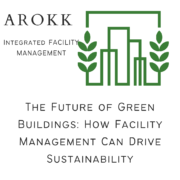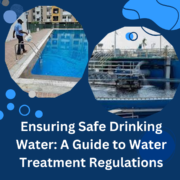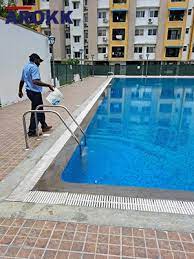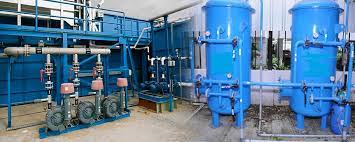The Future of Green Buildings: How Facility Management Can Drive Sustainability
/0 Comments/in Uncategorized/by Arokk Integreted Management Services Pvt. Ltd.The Future of Green Buildings: How Facility Management Can Drive Sustainability
Introduction
Imagine living in a world where every building you enter not only takes care of its human beings but also the planet. This isn’t a dream; it’s the future we’re building through green facilities management.
In this blog post, we’re going to explore how the world of facility management is evolving to drive sustainability in buildings, making our spaces greener, more efficient, and kinder to our planet.
The Role of Facility Management in Sustainability
Facility management is truly the unsung hero of the built environment, playing an important role in ensuring large buildings like apartments , Organization, Office & Home etc., are not just functional and safe, but deeply sustainable. In the face of escalating environmental challenges, the importance of facility managers has increased. we’re not just overseeing operations; we’re leading the charge in integrating green practices into the fabric of our buildings. From harnessing energy efficiency to pioneering waste reduction efforts, facility management is redefining our buildings as sustainable assets that do more than occupy space; we enrich our environment and future.
Energy Efficiency: A Cornerstone of Green Buildings
Energy efficiency is more than a buzzword in the realm of green buildings; it’s a foundational pillar. Facility managers are instrumental in weaving energy-efficient solutions into the operational landscape of buildings. Beyond LED lighting and high-efficiency HVAC systems, we’re exploring advanced energy management systems that use data analytics to optimize energy use in real-time. By doing so, we’re not just slashing carbon emissions and utility bills; we’re setting a new standard for how buildings consume energy intelligently and responsibly
Water Conservation: Every Drop Counts
In the quest for sustainability, water conservation stands as a critical battleground. Facility managers are leading innovative water-saving initiatives, going beyond rainwater harvesting and low-flow fixtures. we’re implementing greywater recycling systems that repurpose wastewater for irrigation and flushing, further reducing the water footprint of our client’s facilities. By treating every drop of water as a precious resource, facility management is not only safeguarding our water supply but also pioneering a new culture in water conservation that resonates across communities and industries.
Waste Reduction: Towards a Zero-Waste Future
Waste reduction is a vital frontier in the sustainability journey, and facility management is at the control of this challenge. Beyond recycling and composting, facility managers are embracing the principles of the circular economy, seeking to reuse materials and minimize the generation of waste. we’re implementing comprehensive waste audits and engaging with suppliers for eco-friendly packaging solutions. This proactive approach to waste management transcends traditional practices, embedding sustainability into the very DNA of facilities and fostering a culture of environmental stewardship among all occupants.
The Future of Green Buildings: Innovations and Trends
The future of green buildings is bright, with innovations and trends that promise to make sustainability more achievable than ever. Let’s see what’s next.
Here are the types of green building:
- Commercial Green Buildings
- Residential Green Buildings
- Industrial Green Buildings
- Institutional Green Buildings
- High-Performance Green Buildings
- LEED-Certified Buildings
- Living Buildings
- Passive Houses
Smart Buildings and IoT
The integration of smart technologies and the Internet of Things (IoT) in facility management service is revolutionizing how buildings operate. These technologies not only allow buildings to adapt to the needs of their occupants by adjusting lighting and temperature but also enable advanced security features like access control and surveillance to ensure people safety. Moreover, IoT devices can monitor building health, predicting maintenance needs before they become costly problems, thereby extending the lifespan of building systems and ensuring uninterrupted comfort for occupants.
Renewable Energy Integration
Renewable energy is becoming a cornerstone of green building strategies. Beyond solar panels and wind turbines, innovative solutions like geothermal heating and cooling systems are being adopted to leverage the earth’s stable temperatures for efficient building climate control. Additionally, the integration of energy storage systems allows buildings to store excess energy generated during peak production times, making renewable energy a more reliable source for powering facilities around the clock.
Biophilic Design: Bringing Nature Inside
Biophilic design goes beyond simply adding plants and natural light; it involves creating living walls and green spaces that serve as natural air filters, enhancing indoor air quality. Another aspect is the use of sustainable materials such as bamboo flooring and recycled wood, which not only reduces the environmental impact of construction but also creates a visually appealing and soothing environment that connects occupants to nature.
Engaging the Community: Building a Culture of Sustainability
When it comes to building a culture of sustainability, facility managers are also leveraging technology to educate and engage. Digital platforms and social media are used to share best practices and celebrate green achievements with the wider community. Additionally, by collaborating with local governments and non-profits, facilities can host workshops and events that promote sustainability, further embedding these values into the community’s consciousness and encouraging widespread participation in sustainable practices.
Conclusion: A Sustainable Future is in Our Hands
The future of green buildings is not just a vision; it’s a reality being built today through the efforts of facility management service. By spearheading initiatives aimed at driving sustainability within the built environment, these individuals are laying the groundwork for a world where buildings serve not only our immediate needs but also contribute positively to the well-being of our planet. This commitment to sustainability is transforming how we think about construction, maintenance, and operational efficiency, ensuring that green practices become the norm rather than the exception.
As we progress, the significance of facility management in championing sustainability continues to expand, reinforcing the notion that the power to cultivate a sustainable future rests with us. Through collective effort and continued innovation, we are on the path to securing a healthier, more sustainable world for generations to come.
At Arokk our highly professional team provide services link office automation, STP / WTP, Indoor Air & Environmental quality check & audit, corporate safety training, hygiene management, food & hospitality services, waste management etc., Need Facility Management service – call us today!





